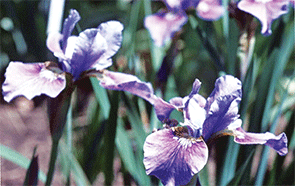Most plants are diploid (their somatic cells contain two copies of each chromosome), although polyploidy naturally occurs in such plants as alfalfa, cotton, potatoes and wheat. Dr. McEwen chose to attempt to develop tetraploid versions of the “beardless iris,” which differs from its “bearded” relative by having smaller flowers and foliage, which is attractive throughout the growing season. By incubating the seeds in a colchicine solution, he created tetraploids:
“When a sprouting seedling … is treated with a solution of colchicine, the process of cell division (mitosis) … is interrupted. During mitosis the chromosome sets double. Normally the sets then move apart to opposite sides of the cell in preparation for cell division. Colchicine inhibits that movement. Cell division stops but not before the chromosomes have doubled. In an attempt to be ‘concise,’ one could say that the cells are ‘stuck with the double set of chromosomes.” This quotation comes from The Siberian Iris, written by Dr. McEwen and illustrated by Jean G. Witt, which has been the definitive book it its field since its publication in 1996.
The challenge was to create stable tetraploid hybrids, which would grow back as tetraploids year after year. To investigate this, Dr. McEwen examined the pollen of the new flowers under a microscope in a primitive hut in his garden. He successfully developed the first two tetraploid Siberian Iris cultivars, with deeper color, larger flowers, stronger stems and wide leaves. He named the first, Orville Fay, after his colchicine mentor, and another, Harpswell Snowburst, after his beloved Maine village. He also applied this technique to developing tetraploid Japanese Iris cultivars.
To fully understand the magnitude of his success, consider the list of awards Dr. McEwen received for his horticultural efforts:
- Hybridizer’s Medal of the American Iris Society, 1976
- Foster Memorial Medal of the British Iris Society, 1977
- Distinguished Service Medal of the Perennial Plant Association, 1991
- Payne Medal (for Japanese Iris), 1992 and 1993
- American Iris Society Gold Medal, 1999
Legacy

Examples of the Orville Fay that Dr. McEwen developed.
By all accounts of those who knew him, despite his exceptional talents, Dr. McEwen was a modest, gentle, kind man who did not draw attention to himself. As he aged, he continued to garden, with the assistance of a walker, which he modified to hold his garden shears and shovel. In 2002, he was recognized at a 100th-year celebration of his birth in Harpswell.


